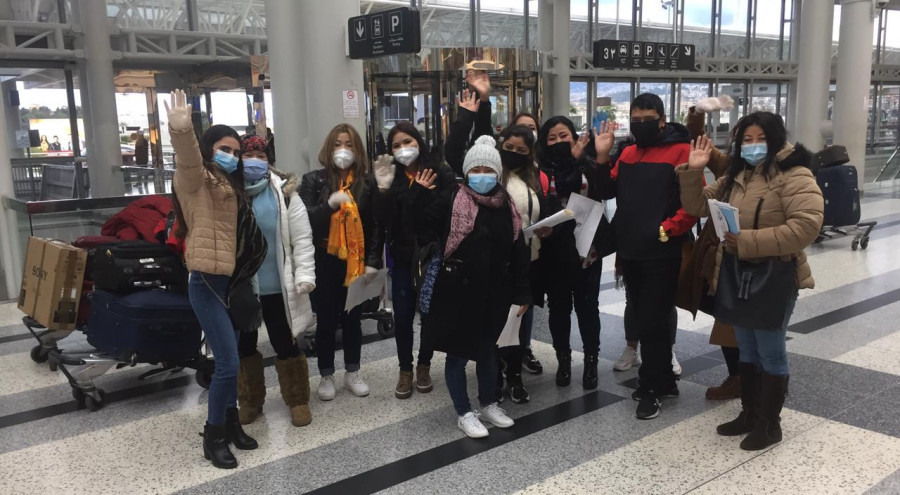National
Nepali women migrants repatriated from Beirut
Migrant workers, mostly women, have been hit hard in the West Asian country reeling under multiple crises.
Chandan Kumar Mandal
Ten undocumented Nepali women migrant workers stranded in Lebanon for several months made it home on Thursday.
The Honorary Consulate of Nepal in Lebanon repatriated the migrants from Beirut as they didn’t have money to pay for a Covid-19 test and buy a plane ticket to get home.
According to Elcheikh Mohamed Ghouzayel, the honorary consul of Nepal in Lebanon, the women arrived in Kathmandu at 12:50 am via a Qatar Airways flight.
“We managed to repatriate ten undocumented Nepali girls and women who did not have any money to travel back home. We also managed to pay their fines and PCR test fees,” Ghouzayel told the Post from Beirut over the phone. “We had planned to send back 11 Nepalis, but one of them tested positive for Covid-19.”
The workers had been living in Lebanon for six to 12 years.
Hundreds of Nepalis living and working in the West Asian country have been hit hard by the economic crisis it has been reeling under since 2019. The Covid-19 pandemic made things worse for the country. Then the deadly explosion in August the capital killed hundreds.
As a result, many Nepalis have lost their jobs and remain stranded in the country, facing hardships amidst the pandemic and waiting to return home.
“The money the repatriated women earned could barely cover their housing and food as they were all undocumented,” said Ghouzayel. “These workers work part-time. After Covid-19, no one wanted to bring outsiders to their homes, so their situation further worsened.”
According to an estimate by the Honorary Consulate of Nepal in Beirut, the country hosts nearly 5,000 Nepalis, including workers and peacekeeping forces. Around 2,000-3,000 Nepalis work as domestic help, around 1,000 as factory workers, and the rest are serving as peacekeepers.
Although the government has banned Nepali women from taking housemaid jobs in Lebanon, women migrant workers continue to go there through illegal routes. They fear returning to Nepal would mean losing their jobs in Lebanon.
After languishing for several months and waiting for government help, the first batch of Nepalis were rescued and brought home in September. Those repatriated in September had also remained without jobs for several months and suffered due to lack of food and accommodation.
With the economic slowdown and then the pandemic, the women Nepali workers have been affected the most as their host families and employers have been unable to pay them. Around 100 undocumented Nepali housemaids have come in touch with the consulate office.
According to Ghouzayel, the consulate office has repatriated around 50 so far.
“Workers who have remained undocumented for several years need help. For those legally working, the local government ensures that they are paid and get return tickets. We have been convincing undocumented workers to reach out to us so that we can help them. The remaining ones do not want to go back,” said Ghouzayel.
“They work as cleaners in small and medium companies and also as housemaids. Most of them did not face problems until the financial crisis that happened last year. With companies switching to work online, these undocumented workers suffered.”
Nepalis are among the preferred nationalities for domestic jobs in Lebanon. Although they are undocumented, they are safe as long as they are not arrested for any serious criminal offences.
According to Ghouzayel, locals who once hired Nepalis for their jobs refuse to deploy any other nationals.
“Lebanese trust Nepalis workers. Nepalis have soaked well in Lebanon and local cultures. They have been living and working here for several years. These could be reasons why those undocumented do not want to return home,” said Ghouzayel. “Some workers have returned home legally. Others have changed their sponsors. But we are always looking for undocumented workers who can return home.”
The consulate in Beirut is asking more Nepalis who need help returning home to reach out to its office. Another batch of seven Nepalis will be repatriated within 20 days. The consulate office is still not sure what others will do.
“We are already publishing notices if anyone needs help to travel. The consulate is in touch with undocumented workers,” said Ghouzayel. “We can manage free tickets in case someone needs help and doesn't know how to reach us. But the decision to return has to be taken by the workers themselves.”




 13.12°C Kathmandu
13.12°C Kathmandu














